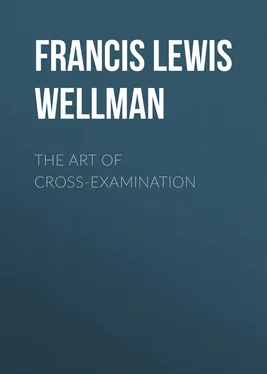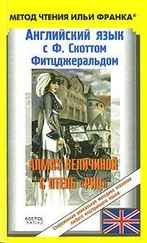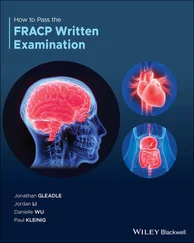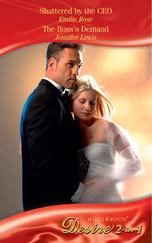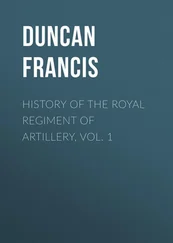Francis Lewis Wellman - The Art of Cross-Examination
Здесь есть возможность читать онлайн «Francis Lewis Wellman - The Art of Cross-Examination» — ознакомительный отрывок электронной книги совершенно бесплатно, а после прочтения отрывка купить полную версию. В некоторых случаях можно слушать аудио, скачать через торрент в формате fb2 и присутствует краткое содержание. Жанр: foreign_edu, Юриспруденция, на английском языке. Описание произведения, (предисловие) а так же отзывы посетителей доступны на портале библиотеки ЛибКат.
- Название:The Art of Cross-Examination
- Автор:
- Жанр:
- Год:неизвестен
- ISBN:нет данных
- Рейтинг книги:3 / 5. Голосов: 1
-
Избранное:Добавить в избранное
- Отзывы:
-
Ваша оценка:
- 60
- 1
- 2
- 3
- 4
- 5
The Art of Cross-Examination: краткое содержание, описание и аннотация
Предлагаем к чтению аннотацию, описание, краткое содержание или предисловие (зависит от того, что написал сам автор книги «The Art of Cross-Examination»). Если вы не нашли необходимую информацию о книге — напишите в комментариях, мы постараемся отыскать её.
The Art of Cross-Examination — читать онлайн ознакомительный отрывок
Ниже представлен текст книги, разбитый по страницам. Система сохранения места последней прочитанной страницы, позволяет с удобством читать онлайн бесплатно книгу «The Art of Cross-Examination», без необходимости каждый раз заново искать на чём Вы остановились. Поставьте закладку, и сможете в любой момент перейти на страницу, на которой закончили чтение.
Интервал:
Закладка:
Before dismissing a witness, however, the possibility of being able to elicit some new facts in our own favor should be taken into consideration. If the witness is apparently truthful and candid, this can be readily done by asking plain, straightforward questions. If, however, there is any reason to doubt the willingness of the witness to help develop the truth, it may be necessary to proceed with more caution, and possibly to put the witness in a position where it will appear to the jury that he could tell a good deal if he wanted to, and then leave him. The jury will thus draw the inference that, had he spoken, it would have been in our favor.
But suppose the witness has testified to material facts against us, and it becomes our duty to break the force of his testimony, or abandon all hope of a jury verdict. How shall we begin? How shall we tell whether the witness has made an honest mistake, or has committed perjury? The methods in his cross-examination in the two instances would naturally be very different. There is a marked distinction between discrediting the testimony and discrediting the witness . It is largely a matter of instinct on the part of the examiner. Some people call it the language of the eye, or the tone of the voice, or the countenance of the witness, or his manner of testifying, or all combined, that betrays the wilful perjurer. It is difficult to say exactly what it is, excepting that constant practice seems to enable a trial lawyer to form a fairly accurate judgment on this point. A skilful cross-examiner seldom takes his eye from an important witness while he is being examined by his adversary. Every expression of his face, especially his mouth, even every movement of his hands, his manner of expressing himself, his whole bearing—all help the examiner to arrive at an accurate estimate of his integrity.
Let us assume, then, that we have been correct in our judgment of this particular witness, and that he is trying to describe honestly the occurrences to which he has testified, but has fallen into a serious mistake, through ignorance, blunder, or what not, which must be exposed to the minds of the jury. How shall we go about it? This brings us at once to the first important factor in our discussion, the manner of the cross-examiner.
It is absurd to suppose that any witness who has sworn positively to a certain set of facts, even if he has inadvertently stretched the truth, is going to be readily induced by a lawyer to alter them and acknowledge his mistake. People as a rule do not reflect upon their meagre opportunities for observing facts, and rarely suspect the frailty of their own powers of observation. They come to court, when summoned as witnesses, prepared to tell what they think they know; and in the beginning they resent an attack upon their story as they would one upon their integrity.
If the cross-examiner allows the witness to see, by his manner toward him at the start, that he distrusts his integrity, he will straighten himself in the witness chair and mentally defy him at once. If, on the other hand, the counsel's manner is courteous and conciliatory, the witness will soon lose the fear all witnesses have of the cross-examiner, and can almost imperceptibly be induced to enter into a discussion of his testimony in a fair-minded spirit, which, if the cross-examiner is clever, will soon disclose the weak points in the testimony. The sympathies of the jury are invariably on the side of the witness, and they are quick to resent any discourtesy toward him. They are willing to admit his mistakes , if you can make them apparent, but are slow to believe him guilty of perjury . Alas, how often this is lost sight of in our daily court experiences! One is constantly brought face to face with lawyers who act as if they thought that every one who testifies against their side of the case is committing wilful perjury. No wonder they accomplish so little with their CROSS-examination! By their shouting, brow-beating style they often confuse the wits of the witness, it is true; but they fail to discredit him with the jury. On the contrary, they elicit sympathy for the witness they are attacking, and little realize that their "vigorous cross-examination," at the end of which they sit down with evident self-satisfaction, has only served to close effectually the mind of at least one fair-minded juryman against their side of the case, and as likely as not it has brought to light some important fact favorable to the other side which had been overlooked in the examination-in-chief.
There is a story told of Reverdy Johnson, who once, in the trial of a case, twitted a brother lawyer with feebleness of memory, and received the prompt retort, "Yes, Mr. Johnson; but you will please remember that, unlike the lion in the play, I have something more to do than roar ."
The only lawyer I ever heard employ this roaring method successfully was Benjamin F. Butler. With him politeness, or even humanity, was out of the question. And it has been said of him that "concealment and equivocation were scarcely possible to a witness under the operation of his methods." But Butler had a wonderful personality. He was aggressive and even pugnacious, but picturesque withal—witnesses were afraid of him. Butler was popular with the masses; he usually had the numerous "hangers-on" in the court room on his side of the case from the start, and each little point he would make with a witness met with their ready and audible approval. This greatly increased the embarrassment of the witness and gave Butler a decided advantage. It must be remembered also that Butler had a contempt for scruple which would hardly stand him in good stead at the present time. Once he was cross-questioning a witness in his characteristic manner. The judge interrupted to remind him that the witness was a Harvard professor. "I know it, your Honor," replied Butler; "we hanged one of them the other day." 2 2 "Life Sketches of Eminent Lawyers," G. J. Clark, Esq.
On the other hand, it has been said of Rufus Choate, whose art and graceful qualities of mind certainly entitle him to the foremost rank among American advocates, that in the cross-examination of witnesses, "He never aroused opposition on the part of the witness by attacking him, but disarmed him by the quiet and courteous manner in which he pursued his examination. He was quite sure, before giving him up, to expose the weak parts of his testimony or the bias, if any, which detracted from the confidence to be given it." 3 3 "Memories of Rufus Choate," Neilson.
[One of Choate's bon mots was that "a lawyer's vacation consisted of the space between the question put to a witness and his answer."]
Judah P. Benjamin, "the eminent lawyer of two continents," used to cross-examine with his eyes. "No witness could look into Benjamin's black, piercing eyes and maintain a lie."
Among the English barristers, Sir James Scarlett, Lord Abinger, had the reputation, as a cross-examiner, of having outstripped all advocates who, up to that time, had appeared at the British Bar. "The gentlemanly ease, the polished courtesy, and the Christian urbanity and affection, with which he proceeded to the task, did infinite mischief to the testimony of witnesses who were striving to deceive, or upon whom he found it expedient to fasten a suspicion."
A good advocate should be a good actor. The most cautious cross-examiner will often elicit a damaging answer. Now is the time for the greatest self-control. If you show by your face how the answer hurt, you may lose your case by that one point alone. How often one sees the cross-examiner fairly staggered by such an answer. He pauses, perhaps blushes, and after he has allowed the answer to have its full effect, finally regains his self-possession, but seldom his control of the witness. With the really experienced trial lawyer, such answers, instead of appearing to surprise or disconcert him, will seem to come as a matter of course, and will fall perfectly flat. He will proceed with the next question as if nothing had happened, or even perhaps give the witness an incredulous smile, as if to say, "Who do you suppose would believe that for a minute?"
Читать дальшеИнтервал:
Закладка:
Похожие книги на «The Art of Cross-Examination»
Представляем Вашему вниманию похожие книги на «The Art of Cross-Examination» списком для выбора. Мы отобрали схожую по названию и смыслу литературу в надежде предоставить читателям больше вариантов отыскать новые, интересные, ещё непрочитанные произведения.
Обсуждение, отзывы о книге «The Art of Cross-Examination» и просто собственные мнения читателей. Оставьте ваши комментарии, напишите, что Вы думаете о произведении, его смысле или главных героях. Укажите что конкретно понравилось, а что нет, и почему Вы так считаете.
